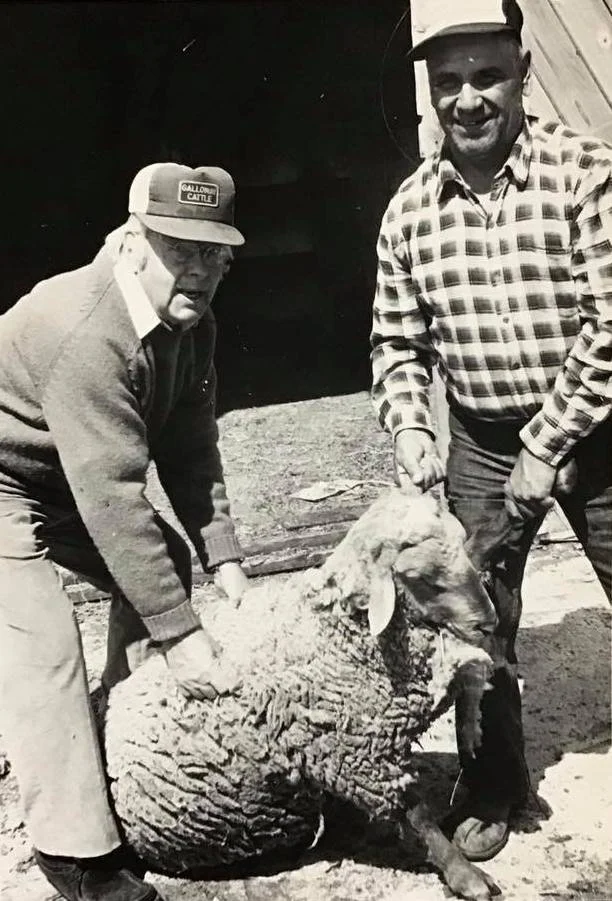Survival school
Kahnawake Survival School students in 1978, during the first year of the school’s existence. (Courtesy: Kanien'keháka Onkwawén:na Raotitióhkwa Language and Cultural Center)
Story told by Joe Deom
We established the school over the weekend. The students called it Survival School because it was for the survival of our language and culture.
Philip Deering set up the school schedule. He must have worked on it for like 24 hours straight. We started school the following Monday.
We used any building that was available; the Golden Age Club, the Moose Club. Kids were travelling all over from class to class. It went on like that up until Christmas.
In the meantime, we negotiated with the government for money to build a school. It wasn’t until almost Christmas that we finally received some money.
We bought six tower buildings. They were prefab construction buildings and we set them up just west of the Golden Age Club. I had laid out where the buildings would go and had the water and sewer installed.
H. Gordon Greene (left) and Baba John Curotte (right) demonstrate the shearing of a sheep to a farm basics class during the early days of Kahnawake Survival School. (Courtesy: Joanne McGregor)
After New Year’s, the kids started school in those buildings. We had maybe 300 students.
All the teachers were volunteers. Nobody was paid because we didn’t have the money to pay them.
We got books from all over the city that were probably obsolete. Chairs, tables, desks; everything was surplus.
After a whole year, we were still negotiating for a permanent facility for our kids. The band council set aside the land and we moved those six buildings onto the site and put permanent foundations on them. It was like a campus style.
A lot of pressure was put on Indian Affairs by the women, especially Muriel Deer. She’s the one who was the real impetus of that school. She knew how to use pressure and helped us get funding and everything.
I had never come across women of that calibre in my life. They were the most dynamic group of women that I’ve ever come across.
Kanien'kéha
↓
Kanien'kéha ↓
Survival Tsi Ionterihwaienstáhkhwa’
The Kahnawake Combined Schools Committee circa 1979. Posing from left to right is Muriel Deer, Shirley Scott, Lorna Delormier, Nancy Deer and Geraldine Standup. (Courtesy: Linda Karonhienhawe Delormier)
Joe Deom roká:raton
Tsi iotahia’khsero’ktahkwèn:ke wahatirihwahserón:ni’ tsi ionterihwaienstáhkhwa’. Ronterihwaiénstha’ wahatinà:tonhkwe’ Survival Tsi Ionterihwaienstáhkhwa’ né: tsi ne ki’ ioteríhonte’ akanónhstate’ tsi nitewawennò:ten nok tsi niionkwarihò:ten.
Phillip Deering waharihwahserón:ni’ tsi nahò:ten’ enhontéweienste’ tsi niiahià:khseres. Entà:’on 24 na’kahwistà:’eke’ ne roio’tèn:’en tánon’ iah tóka’ tha’tehotà:’on.
Tsi sahentén:ta’ne’ taiakwatáhsawen’ tsi ionterihwaienstáhkhwa’.
Wa’ákwatste’ thikawenní:io na’kanonhsò:ten’ ón:ton’ aiákwatste’; Thotí:ien’s raotitióhkwa’, Ska’niónhsa Raotitióhkwa’. Ratiksa’okòn:’a wahontenonhsatenión:ko’ akwé:kon tahón:nehte’ tsi nón: nihonterihwaiénstha’ tsi niió:re’ Wahatón:ni’.
Kakoráhsera’ niá:re’ wa’akwatsénhaien’ nia’takarihwaién:ta’ne’ aionkwahwistaién:ta’ne’ aiakwatenonhsón:ni’ tsi ionterihwaienstáhkhwa’. Kháre ki’ ó:nen ákta Wahatón:ni’ wa’onkhihwíston’ aiakwatenonhsón:ni’.
Ià:ia’k nikanónhsake wa’akwanonhsahní:non’. Ohén:ton tkanonhsón:ni thí:ken tánon’ è:neken nonkwá:ti ne Thotí:ien’s Raotitióhkwa’ wa’akwanonhsotónnion’. Watieronnítston ka’ nón:we enkanonhsó:ton tánon’ wa’kerihwahserón:ni’ aontahatihnekínion’te’ tánon’ ahatihonro’tatárion’.
Aerial view of the original Kahnawake Survival School (KSS) campus, located right behind the current KSS. (Courtesy: Dwayne Stacey)
Shontóhetste’ tsi na’teiontatenoronhkwánions nikahá:wi, thí: tho kanonhsó:ton tahontásawen’ ne ratiksa’okòn:’a ahonterì:waienste’. Tóka’ nòn:wa 300 nihá:ti ratiksa’okòn:’a ronterihwaiénsthahkwe’. Akwé:kon ronwatirihonnién:ni iakothonkarià:kon/wa’ontahsnié:nen’. Iah ki’ ónhka teiakotkarià:ki ase’kénh iah teionkwahwistaién:tahkwe’ ne aiakhikária’khse’.
Tsik nón:we ne kanatowanèn:ne wa’onkhihiatónhseron’ ne aiákwatste’. Akwé:kon iah ónhte’ teskarihwáhsta’. Wa’onkhí:ion’ anitskwahra’shòn:’a, atekhwahra’shòn:’a; akwé:kon tsi nahò:ten’ iotatén:ron.
Tsóhsera ontóhotste’, tánon’ shé:kon ki’ nòn:wa nikahá:wi ionkwatsénhaien’ ne Kakoráhsera’ né:ne aionkwanonhsó:ta’ne’ tsi ionterihwaienstáhkhwa’. Ratitsénhaiens wahatinónhstate’ tsi niwahóntsa’ iakwatstà:ne’ tánon’ tho ia’tiakwanatáhkwa’te’ thí:ken ià:ia’k nikanónhsake. Wahonte’nonhkonniánion’ tsi nón:we ienshatinónhsaien’ ne kanonhsa’shòn:’a. Tóhkara tewen’niáwe’ niwahsì:take tsi na’tekónteron tsi ní:tsi wahatinonhsakè:ron’ tsi ionterihwaienstáhkhwa’.
Konnón:kwe é:so tsi iahonwatì:reke’ ne Indian Affairs, kwah sénha ne Muriel Deer. Akaónha nen’ nè:’e ne kwah wa’onterihwahkwísron’ aonterihwahtén:ti’ tsi ionterihwaienstáhkhwa’. Iakoterièn:tarahkwe’ oh ní:tsi iaierihwà:reke’ tánon’ wa’onkhihsnié:nen’ oh naiá:wen’ne’ aionkhihwíston’ nok ó:ia’ nahò:ten’ aionkwaién:ta’ne’.
Iah ki’ nonwén:ton tsi nikónhnhes tha’teionkwatátken ne konnón:kwe ne eh tho niioti’nikonhratshà:ni.
Edited by: Melissa Stacey, Local Journalism Initiative Reporter
Translated by Sahawisó:ko’ Arquette




